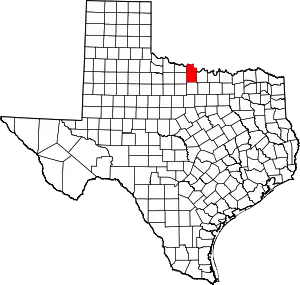Henrietta, Texas
Henrietta is a city in and the county seat of Clay County, Texas, United States.[5] It is part of the Wichita Falls metropolitan statistical area. The population was 3,141 at the 2010 census,[6] a decline of 123 from the 2000 tabulation of 3,264.
Henrietta | |
|---|---|
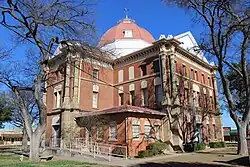 | |
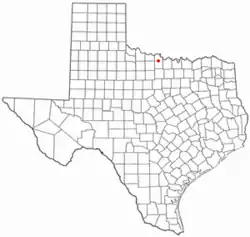 Location of Henrietta, Texas | |
 | |
| Coordinates: 33°49′N 98°12′W | |
| Country | United States |
| State | Texas |
| County | Clay |
| Area | |
| • Total | 5.21 sq mi (13.49 km2) |
| • Land | 5.11 sq mi (13.22 km2) |
| • Water | 0.10 sq mi (0.27 km2) |
| Elevation | 912 ft (278 m) |
| Population (2010) | |
| • Total | 3,141 |
| • Estimate (2019)[2] | 3,118 |
| • Density | 610.77/sq mi (235.81/km2) |
| Time zone | UTC-6 (Central (CST)) |
| • Summer (DST) | UTC-5 (CDT) |
| ZIP code | 76365 |
| Area code | 940 |
| FIPS code | 48-33284[3] |
| GNIS feature ID | 1359039[4] |
| Website | www |
History


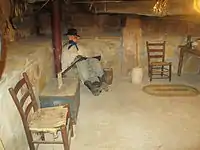

Henrietta is one of the oldest settled towns in north central Texas. It sits at the crossroads of U.S. Highway 287, U.S. Highway 82, State Highway 148, and Farm to Market Road 1197 in north central Clay County.
Clay and Montague counties were separated in 1857 from Cooke County to the east, and Henrietta was named as the county seat. The etymology of the town remains a mystery, though several explanations have been offered. Regardless of the origin of its name, Henrietta became the center of gravity for the fledgling county. In 1860, as the only town in the county, it had 109 residents, 10 houses, and a general store. It sat at the far western edge of Anglo expansion in north-central Texas, but Native Americans remained a viable threat to current and future settlers. In 1862, Henrietta opened its post office. In the early 1860s, there were continuous attacks from local tribes. By late 1862, Henrietta was abandoned, and white settlers returned east to Cooke and Montague counties. Remaining structures were burned. Anglos continued to attempt resettlement, and in 1865 after the Civil War, a group attempting resettlement was massacred. A number of Quakers attempted to reoccupy the former townsite, but its members were either killed or fled. In 1870, fifty soldiers and Kiowa Indians fought a battle in the ruins of Henrietta.
After the battle, white settlers returned to Henrietta, this time permanently. In 1874, the post office reopened, and Henrietta quickly became the economic hub of north-central Texas. In 1882, the Fort Worth and Denver Railway reached Henrietta on its southern side, and in 1887, Henrietta became the westernmost terminus for the Gainesville, Henrietta, and Western Railway.
In 1895, the Wichita Falls Railway, one of the properties of Joseph A. Kemp and Frank Kell, linked Henrietta with Wichita Falls; sold in 1911, this 18-mile (29 km) segment was operated thereafter by the Missouri-Kansas-Texas Railroad, known as the Katy. This particular track was abandoned in 1970. MK&T then built in Wichita Falls a station, offices, a roundhouse, and three switching tracks.[8]
After heavy lobbying by businessmen, Henrietta became a logistical supply point for various operations in north-central Texas, including mining in Foard and Archer counties. The Southwestern Railway Company in 1910 completed a rail linking Henrietta with Archer City.
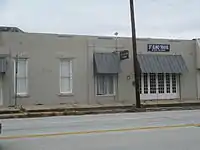
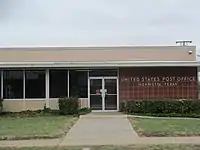
Though it had been settled earlier, Henrietta did not incorporate until 1881. The Clay County courthouse was built in 1884 and is still in use. By 1890, the population had reached 2,100, and the town boasted a 400-seat opera house, five churches, a new jailhouse, and a school. From 1893 to 1895, it had a college—Henrietta Normal College—for the training of teachers. It remained the economic hub of the county at the turn of the 20th century.
The St. Elmo Hotel, established about 1895 in Henrietta,[9] had among its guests Quanah Parker, who married two of his wives there, and U.S. President Theodore Roosevelt, when he toured the North Texas area. When the top floors of the hotel burned, the facility closed and never reopened. A portion of the lower floor now houses an antiques store.
The growth of Henrietta waned in the 20th century as Wichita Falls grew rapidly into the most prosperous economic center in the area. The Southwestern Railway line was abandoned in 1920, and the Gainesville, Henrietta, and Western Railway line closed in 1969. By 1990, the population remained under 3,000. In 2000, it topped 3,000 for the first time since the 1970 census. In many ways, Henrietta is a "bedroom community" for Wichita Falls but is still the largest city in Clay County.
The play Texas presented during summers at the Palo Duro Canyon near Amarillo is loosely based on the history of Henrietta.
The 1995 film, The Stars Fell on Henrietta, produced by Clint Eastwood and David Valdez, and starring Robert Duvall, Brian Dennehy and Billy Bob Thornton, depicts the Texas oil rush of the 1930s and is set in Henrietta.[10]
Geography
Henrietta is located near the center of Clay County at 33°49′N 98°12′W (33.8160, –98.1938).[11] It is 20 miles (32 km) southeast of Wichita Falls, 28 miles (45 km) northwest of Bowie, and 95 miles (153 km) northwest of Fort Worth.
According to the United States Census Bureau, Henrietta has a total area of 5.2 square miles (13.4 km2), of which 5.1 square miles (13.1 km2) is land and 0.1 square miles (0.3 km2), or 1.98%, is water.[12]
Demographics
| Census | Pop. | Note | %± |
|---|---|---|---|
| 1890 | 2,100 | — | |
| 1900 | 1,614 | −23.1% | |
| 1910 | 2,104 | 30.4% | |
| 1920 | 2,563 | 21.8% | |
| 1930 | 2,020 | −21.2% | |
| 1940 | 2,391 | 18.4% | |
| 1950 | 2,813 | 17.6% | |
| 1960 | 3,062 | 8.9% | |
| 1970 | 2,897 | −5.4% | |
| 1980 | 3,149 | 8.7% | |
| 1990 | 2,896 | −8.0% | |
| 2000 | 3,264 | 12.7% | |
| 2010 | 3,141 | −3.8% | |
| 2019 (est.) | 3,118 | [2] | −0.7% |
| U.S. Decennial Census[13] | |||
| Race | Number | Percentage |
|---|---|---|
| White (NH) | 2,727 | 87.66% |
| Black or African American (NH) | 21 | 0.68% |
| Native American or Alaska Native (NH) | 24 | 0.77% |
| Asian (NH) | 29 | 0.93% |
| Some Other Race (NH) | 13 | 0.42% |
| Mixed/Multi-Racial (NH) | 131 | 4.21% |
| Hispanic or Latino | 166 | 5.34% |
| Total | 3,111 |
As of the 2020 United States census, there were 3,111 people, 1,287 households, and 817 families residing in the city.
Education
The city is served by the Henrietta Independent School District. South of town between Henrietta and Jacksboro, students attend Midway Independent School District.
Transportation
 U.S. Highway 287 west to Wichita Falls; east-southeast to Fort Worth
U.S. Highway 287 west to Wichita Falls; east-southeast to Fort Worth U.S. Highway 82 west to Lubbock; east to Nocona
U.S. Highway 82 west to Lubbock; east to Nocona State Highway 148 south to Jacksboro; north to Petrolia
State Highway 148 south to Jacksboro; north to Petrolia Farm to Market Road 1197 north to Hurnville
Farm to Market Road 1197 north to Hurnville Farm to Market Road 2847 southwest to FM 2606, Lake Arrowhead, and Halsell
Farm to Market Road 2847 southwest to FM 2606, Lake Arrowhead, and Halsell
Climate
The climate in this area is characterized by hot, humid summers and generally mild to cool winters. According to the Köppen Climate Classification system, Henrietta has a humid subtropical climate, abbreviated "Cfa" on climate maps.[17]
Notable people
- Charline Arthur (1929–1987), boogie woogie and blues musician[18]
- Finis Alonzo Crutchfield Jr. (1916–1986), United Methodist Church bishop, born in Henrietta[19]
- Eddie Joe Davis, TAMU Corps Commander, 1967, Vietnam veteran/paratrooper 173d Airborne Brigade, Director of TAMU Foundation for over 20 years, and interim President of TAMU for two years
- Frank N. Ikard, congressman from Texas's 13th congressional district from 1951 to 1961, born in Henrietta in 1914
See also
References
- "2019 U.S. Gazetteer Files". United States Census Bureau. Retrieved August 7, 2020.
- "Population and Housing Unit Estimates". United States Census Bureau. May 24, 2020. Retrieved May 27, 2020.
- "U.S. Census website". United States Census Bureau. Retrieved January 31, 2008.
- "US Board on Geographic Names". United States Geological Survey. October 25, 2007. Retrieved January 31, 2008.
- "Find a County". National Association of Counties. Archived from the original on May 31, 2011. Retrieved June 7, 2011.
- "2010 Census: Population of Texas Cities Arranged in Alphabetical Order". www.tsl.state.tx.us. Retrieved April 11, 2013.
- "About Us, First Baptist Church Henrietta". fbchenrietta.org. Archived from the original on August 22, 2013. Retrieved April 11, 2013.
- "Brian Hart, "Joseph Alexander Kemp"". tshaonline.org. Retrieved April 16, 2013.
- "St. Elmo Hotel, 1895 Photo". stoppingpoints.com. Retrieved April 7, 2013.
- The Stars Fell on Henrietta (1995)
- "US Gazetteer files: 2010, 2000, and 1990". United States Census Bureau. February 12, 2011. Retrieved April 23, 2011.
- "Geographic Identifiers: 2010 Census Summary File 1 (G001): Henrietta city, Texas". U.S. Census Bureau, American Factfinder. Archived from the original on February 13, 2020. Retrieved July 29, 2015.
- "Census of Population and Housing". Census.gov. Retrieved June 4, 2015.
- "Explore Census Data". data.census.gov. Retrieved May 20, 2022.
- https://www.census.gov/
- "About the Hispanic Population and its Origin". www.census.gov. Retrieved May 18, 2022.
- Climate Summary for Henrietta, Texas
- Neely, Emily (2003). "Charline Arthur: The Unmaking of a Honky-Tonk Star". Southern Cultures. 8 (3): 86–96.
- Emily Yoffe, "A Faithful Secret - Death From Aids Brought Bishop`s Life To Light." Texas Monthly. December 2, 1987. Retrieved March 11, 2015.
External links
- City of Henrietta official website
- The Clay County Leader, local newspaper
- See historic photos of Henrietta from the Clay County Historical Society, hosted by the Portal to Texas History

